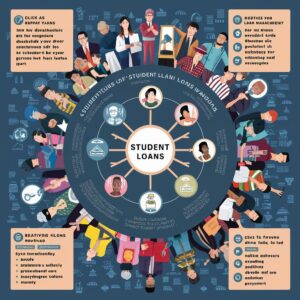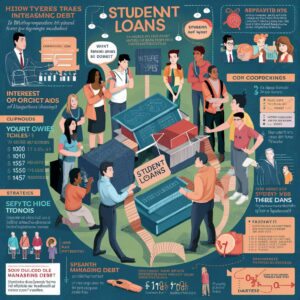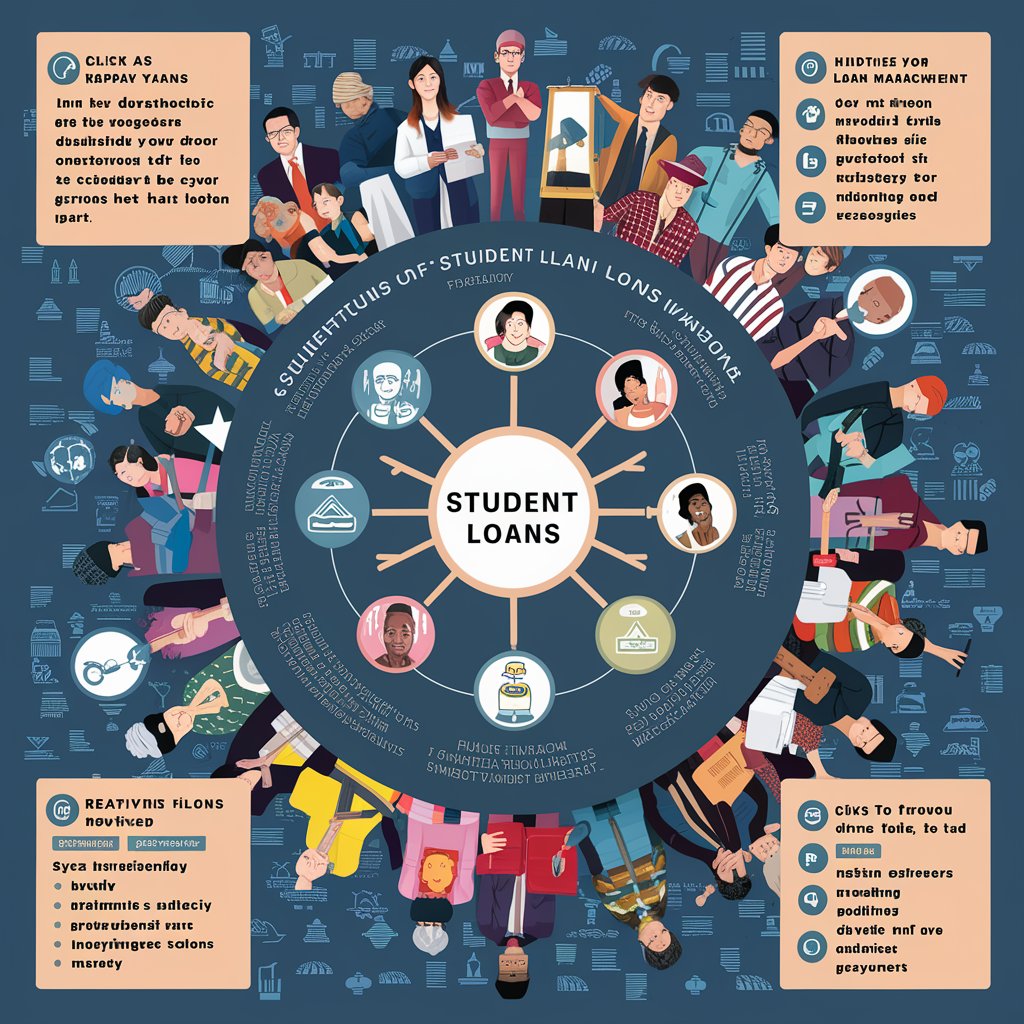
Introduction
Student loans can feel like a mysterious and daunting part of the college experience. But don’t worry! We’re here to break it down for you. By understanding what student loans are and how to manage them, you can take control of your financial future. This guide will cover everything from the basics of student loans to practical strategies for managing them effectively.
What are Student Loans?
Student loans are funds borrowed to cover education-related expenses, such as tuition, books, and living costs. Unlike scholarships and grants, loans need to be repaid with interest.
Federal Student Loans
Federal student loans are provided by the government and generally offer lower interest rates and more flexible repayment options compared to private loans.
Direct Subsidized Loans
These loans are available to undergraduate students with financial need. The government pays the interest while you’re in school and during the grace period.
Direct Unsubsidized Loans
These loans are available to both undergraduate and graduate students. Unlike subsidized loans, interest accrues during all periods.
Direct PLUS Loans
These loans are available to graduate students and parents of dependent undergraduates. They have higher interest rates and require a credit check.
Federal Perkins Loans
Although no longer available, Perkins Loans were low-interest federal loans for students with exceptional financial need.
Private Student Loans
Private student loans come from banks, credit unions, and other private lenders. They can fill the gap when federal loans aren’t enough but often come with higher interest rates and fewer repayment options.
Eligibility and Application Process
Federal Loans Eligibility
Eligibility for federal loans depends on your financial need, school cost, and other factors. U.S. citizenship or eligible non-citizenship is also required.
How to Apply for Federal Loans
Complete the Free Application for Federal Student Aid (FAFSA) to determine your eligibility for federal loans.
Private Loans Eligibility
Private loans require a credit check, and often a co-signer, especially for students with limited credit history.
How to Apply for Private Loans
Apply directly through the lender’s website, and be prepared to provide detailed financial information.
Interest Rates and Repayment Terms
Fixed vs. Variable Interest Rates
Fixed rates stay the same for the life of the loan, while variable rates can change over time.
How Interest Rates Affect Repayment
Higher interest rates increase the total amount you repay over time. Understanding your interest rate helps you plan your repayment strategy.
Typical Repayment Terms
Repayment terms typically range from 10 to 30 years, depending on the loan type and amount borrowed.
Repayment Plans
Standard Repayment Plan
Fixed monthly payments over 10 years.
Graduated Repayment Plan
Payments start low and increase every two years, also over 10 years.
Income-Driven Repayment Plans
Income-Based Repayment (IBR)
Payments are 10-15% of discretionary income, with forgiveness after 20-25 years.
Pay As You Earn (PAYE)
Similar to IBR, but generally offers lower payments and shorter forgiveness period.
Revised Pay As You Earn (REPAYE)
Payments are 10% of discretionary income, with different forgiveness terms based on education level.
Income-Contingent Repayment (ICR)
Payments are the lesser of 20% of discretionary income or fixed payments over 12 years, adjusted for income.
Loan Forgiveness Programs
Public Service Loan Forgiveness (PSLF)
Forgives remaining balance after 120 qualifying payments while working in public service.

Teacher Loan Forgiveness
Forgives up to $17,500 for teachers in low-income schools after five years of service.
Other Forgiveness Options
Various state and profession-specific programs may offer loan forgiveness.
Managing Student Loans During School
In-School Deferment
Many loans allow deferment while you’re in school, meaning no payments are required.
Interest Accumulation
Unsubsidized loans accrue interest during deferment, increasing the total repayment amount.
Budgeting and Financial Planning
Create a budget to manage your funds effectively and avoid unnecessary debt.
Grace Period After Graduation
What is a Grace Period?
A grace period is a set time after graduation during which you don’t have to make loan payments.
Preparing for Repayment
Use this time to find a job and plan your repayment strategy.
Strategies for Managing Student Loan Debt
Creating a Budget
Track your income and expenses to ensure you can meet your loan payments.
Extra Payments and Refinancing
Making extra payments can reduce interest and loan term. Refinancing may lower interest rates.
Avoiding Common Pitfalls
Stay organized, avoid missed payments, and be wary of scams promising quick fixes.
Dealing with Financial Hardship
Forbearance and Deferment
Temporary postponement or reduction of payments during financial hardship.
Loan Consolidation
Combining multiple federal loans into one can simplify payments but may increase total interest.
Seeking Financial Counseling
Professional advice can help you navigate repayment options and manage debt.
The Impact of Student Loans on Credit Score
How Loans Affect Credit
On-time payments build credit, while missed payments harm it.
Managing Credit Score While Repaying Loans
Monitor your credit score and maintain good financial habits.
Tips for Future Students
Planning Ahead
Understand potential costs and funding options before committing.
Scholarships and Grants
Seek out scholarships and grants to reduce loan dependence.
Reducing Loan Dependence
Consider part-time work, community college, and other cost-saving measures.
Conclusion
Understanding student loans and managing them effectively is crucial for your financial health. By planning ahead, knowing your options, and staying proactive, you can minimize debt and take control of your financial future.
FAQs
What happens if I can’t repay my student loans?
Defaulting on student loans can damage your credit and lead to legal action. Explore options like income-driven repayment plans and deferment.
Can student loans be forgiven?
Yes, through programs like Public Service Loan Forgiveness and Teacher Loan Forgiveness.
How do I know which repayment plan is best for me?
Compare plans based on your income, loan amount, and career plans. Financial advisors can also provide guidance.
What are the benefits of consolidating student loans?
Simplifies repayment by combining multiple loans into one, potentially lowering monthly payments but might increase overall interest.
How can I reduce the amount of student loans I need?
Apply for scholarships and grants, consider


